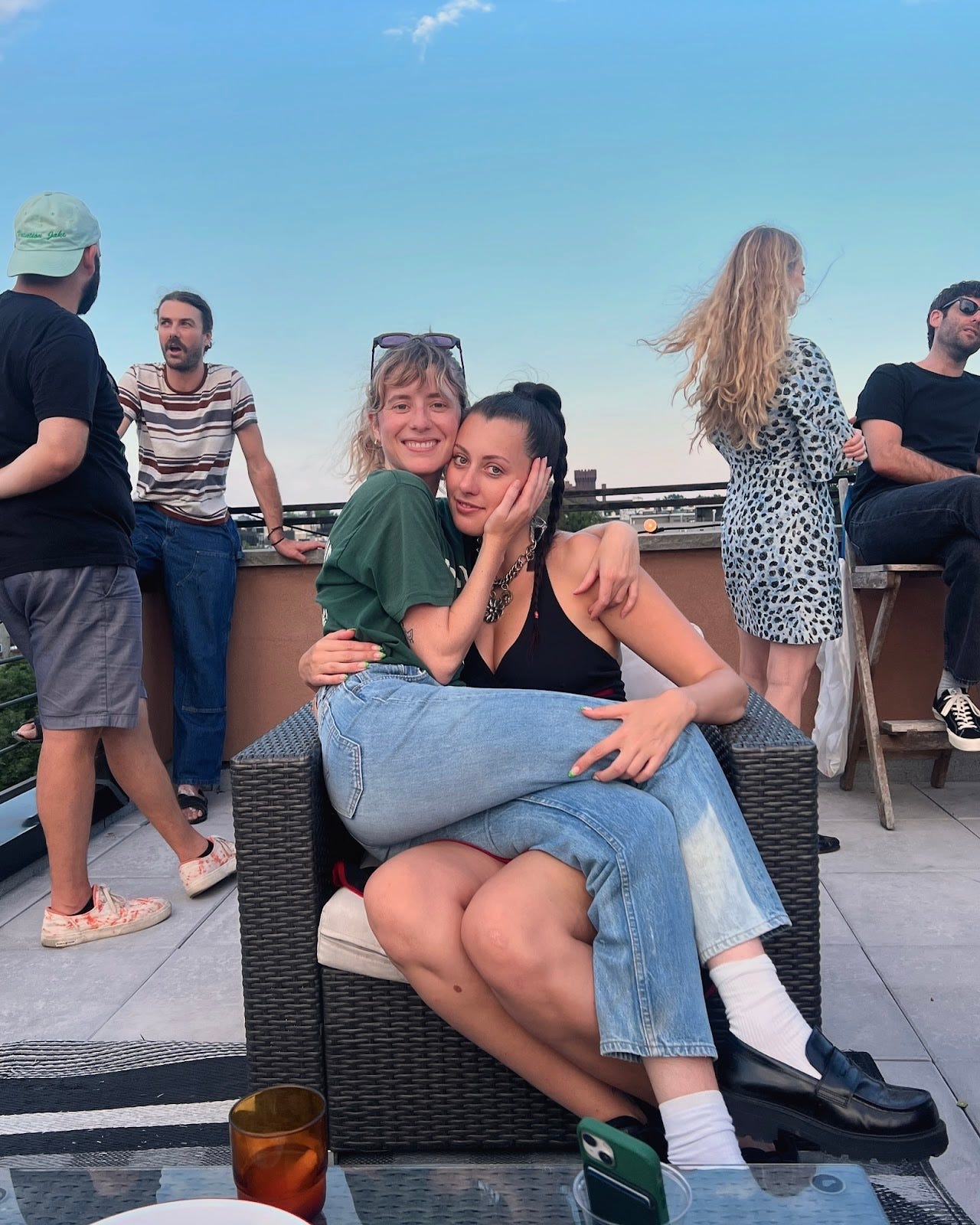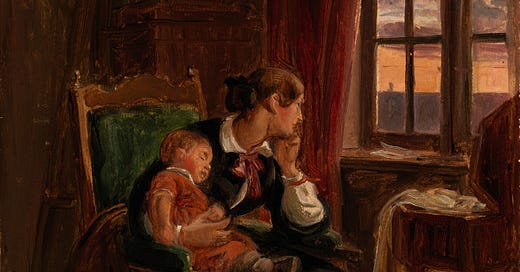Last Tuesday morning, Avi and I wheeled the stroller into the bagel shop near our apartment. It had been a hectic morning at home—cooking breakfast for the baby, feeding the baby, cleaning up after the baby (smeared hands and face, soiled bib and clothes, sticky high chair and plate and cup, globs of food covering the floor underneath, crusty pan we’d used to cook her eggs, and that was just breakfast). Which is to say it had been a typical morning, and when it came to feeding ourselves, we were already out of gas. It was 9am.
After placing our order, we sat at a small round table next to a pair of friends immersed in conversation. Or were they lovers, getting food after a night out together? I casually eavesdropped while we waited. They were wrapped in scarves, gossiping about someone, laughing easily, picking at their food like they had nowhere to be. There was something familiar about them. It wasn’t that I knew them, it was that I understood them. Their open energy, their nonchalance, their presence. As the minutes passed, my curiosity gave way to something else—a gentle simmer of envy for what they had: no kids.
Of course, I can’t say for sure they weren’t parents. Avi recently reminded me of this after a similar scene played out when we walked past a stylish pair of friends-or-lovers on the street, and I announced my jealousy. But I swear I can tell. It’s something in the posture, the gait, the way they look around. I’m thinking of young-ish adults specifically—the 25-to-35 set, busy with life but not kids, their playgrounds figurative rather than literal. This group is not a monolith in the slightest—and they have very real and varied struggles—but their seeming lack of kids conjures such a specific emotion for me now that I group them together anyway. I project onto them a certain joie de vivre I associate with specifically wonderful aspects of my life before I was a parent.

A couple weeks ago I wrote effusively about what I liked (and loved) about having a kid. And while that feels like my defining assessment of the experience so far, this envy for non-parents runs along a diminutive parallel track. It took me nearly a year to feel it, or maybe it’s not so much the amount of time that’s passed as the time I’ve been having lately: rocky with teething and sleep regressions and viruses and whining. For the past month or so I’ve been mourning more viscerally the person I was before I was a mom, the way I saw the world, the way I socialized or wandered around or spent a free day (free!). I am in a lot of ways the same person I’ve always been but in those specific senses, completely different. My awareness of this is never sharper than in the presence of child-free adults being obviously child-free. Lately I’ve been noticing them everywhere, observing them with a Victorian kind of longing for a life I’ll never have again.
I’ve explored envy a lot on Maybe Baby. In September 2021 I explored the way envy clouds our judgement and in June 2022 I wrote about learning to want different things than everyone else. This past August I wrote about making personal choices in the face of envy and building our life around those, and on the podcast I’ve often talked about envy as tea leaves for what we really want. But this envy I’ve been experiencing feels distinct from the kind I’m referring to in those columns—usually, classic American envy, for the rich, the powerful, the beautiful, the popular. In contrast, what I’m feeling is not aspirational. It’s a lot more benign than that, having little to no bearing on my life choices going forward.
Had I heard, before I had kids, that a parent envied me, I’d probably interpret that as a form of regret—that some part of them wanted to trade what they had for what I had. But knowing, from the other side, that regret has nothing to do with it, I’m forced to reckon with a kind of envy that doesn’t suggest a course of action, but is more like a flight of fancy—daydreaming for daydreaming’s sake. Maybe a lot of our envy is like that, but because we’re so used to understanding our desires as calls to action, we interpret them differently.
In his book Status Anxiety, Alain de Botton posits that Americans are more susceptible to envy because we’re obsessed with equal opportunity and are therefore less likely to accept our circumstances. I find this pretty convincing, because it doesn’t concern whether “equal opportunity” actually exists here (it obviously doesn’t), but rather our shared belief that it does, which impacts our sense of what’s possible and therefore our disappointment at not living up to all of it. That sense of what’s possible is everything, and as the realm of what we consider possible expands into absurd territory (never get old! never work! fix the “unattractive” way your eyelids move!), our desire may know no end.
It’s interesting to think of envy in that context, as a sort of symptom of belief in our own potential, rather than a detriment to it. I think that’s why my occasional yearning for child-free life has been illuminating. Unlike a yearning for, say, a new apartment or job or face or body, I possess no potential to change my life in response to it. I’m so happy I became a parent, and anyway, there’s no going back. I have to accept my situation, and that acceptance neuters the envy pretty quickly. It’s very un-American to accept things as they are, even accept our longing, but in the right context, it can be liberating.
Under my most recent newsletter on envy in August, a commenter named Shelby wrote that when she feels envious, “Rather than trying to tell myself ‘they may not even be that happy’ or ‘maybe their lives actually AREN’T better than mine’ instead I think ‘maybe it is.’” And then she moves on. The simplicity of this solution is delightful—the way it requires so little intellectualizing, rendering envy an amusement rather than a threat. No need to convince yourself you have more than someone else, thereby caving to the doomed math of who’s better off really. It’s a self-removal from the competition, or a rejection of the competitive premise entirely.
Obviously some envy can be telling, motivating, clarifying. But I think it can just as often be irrelevant. The recent blips of longing I’ve been experiencing for my life pre-kid haven’t felt particularly upsetting. They feel more like a passing wistfulness for life’s many eras. We’ve all been given infinite social scripts for reacting to our envy—pulling ourselves up by the bootstraps, following our dreams, redefining wealth or beauty—and a lot fewer for simply observing or spending time with our envy, then moving on. Desire doesn’t have to be an invitation. Sometimes it can just wander through us, stir a little something in our chests. Then, with our permission, float away.
My favorite thing I read last week was “Casual Viewing,” by Will Tavlin for N+1, a fascinating (and depressing) oral history of Netflix, and a diagnosis of streaming’s effect on entertainment and Hollywood generally. Last week’s 15 things also included my new favorite stool, an insane graph I forgot I made, the perfect 72-minute movie, an unlikely perfect kitchen accessory, and more. The rec of the week was about tracking clothes (and clothing consumption) in spreadsheets and apps, and whether it’s worth it.
My podcast last week was about a lesson I learned last year (regarding a mistake a made about childcare) and how it impacted my new year’s resolutions.
I hope you have a nice Sunday!
Haley





